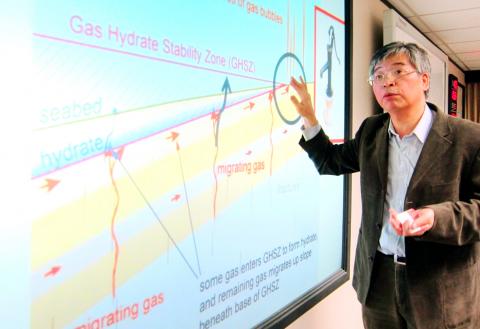Researchers claim to have unlocked the interaction patterns between the seabed fluctuations in the southwestern oceanic area of Taiwan, which is home to many underwater mud volcanoes, and the ebb and flow of tides.
A team from National Central University also discovered that during seabed fluctuations caused by changes in tides, methane gas is released into the water and atmosphere, which may be collected for energy resources or become greenhouse gas.
At a press conference at the National Science Council yesterday, Hsu Shu-kun (許樹坤), a professor of earth sciences at the university, said there are many mud volcanoes about 100m tall located 500m or more below the surface of the sea in that area.

Photo: Chen Yi-ching, Taipei Times
His council-funded team found that as the tide changes, the depth of the water also changes, leading to changing water pressure on the seabed.
When the tide is low, Hsu said, the water becomes shallower, reducing the water pressure on the seabed, whereupon methane clathrate (methane trapped within a crystal structure of water, in the form of a solid) under the seabed releases the methane component and is released from the more shallow parts of the seabed.
Hsu said the release of methane from the seabed about 500m underwater and the fluctuations of the seabed in connection with the changing tide work like a “water pump.” He said such a process has not been found in other parts of the world.
Based on the data gathered so far, the concentration of methane and carbon dioxide released as a result of seabed fluctuations is very high, Hsu said.
If ways were found to collect the methane, Hsu said, it could be turned into a valuable energy source.

A preclearance service to facilitate entry for people traveling to select airports in Japan would be available from Thursday next week to Feb. 25 at Taiwan Taoyuan International Airport, Taoyuan International Airport Corp (TIAC) said on Tuesday. The service was first made available to Taiwanese travelers throughout the winter vacation of 2024 and during the Lunar New Year holiday. In addition to flights to the Japanese cities of Hakodate, Asahikawa, Akita, Sendai, Niigata, Okayama, Takamatsu, Kumamoto and Kagoshima, the service would be available to travelers to Kobe and Oita. The service can be accessed by passengers of 15 flight routes operated by

Chinese spouse and influencer Guan Guan’s (關關) residency permit has been revoked for repeatedly posting pro-China videos that threaten national security, the National Immigration Agency confirmed today. Guan Guan has said many controversial statements in her videos posted to Douyin (抖音), including “the red flag will soon be painted all over Taiwan” and “Taiwan is an inseparable part of China,” and expressing hope for expedited reunification. The agency last year received multiple reports alleging that Guan Guan had advocated for armed reunification. After verifying the reports, the agency last month issued a notice requiring her to appear and explain her actions. Guan

GIVE AND TAKE: Blood demand continues to rise each year, while fewer young donors are available due to the nation’s falling birthrate, a doctor said Blood donors can redeem points earned from donations to obtain limited edition Formosan black bear travel mugs, the Kaohsiung Blood Center said yesterday, as it announced a goal of stocking 20,000 units of blood prior to the Lunar New Year. The last month of the lunar year is National Blood Donation Month, when local centers seek to stockpile blood for use during the Lunar New Year holiday. The blood demand in southern Taiwan — including Tainan and Kaohsiung, as well as Chiayi, Pingtung, Penghu and Taitung counties — is about 2,000 units per day, the center said. The donation campaign aims to boost

The Central Weather Administration (CWA) said a magnitude 4.9 earthquake that struck off the coast of eastern Taiwan yesterday was an independent event and part of a stress-adjustment process. The earthquake occurred at 4:47pm, with its epicenter at sea about 45.4km south of Yilan County Hall at a depth of 5.9km, the CWA said. The quake's intensity, which gauges the actual effects of a temblor, was highest in several townships in Yilan and neighboring Hualien County, where it measured 4 on Taiwan's seven-tier intensity scale, the CWA said. Lin Po-yu (林柏佑), a division chief at the CWA's Seismological Center, told a news conference